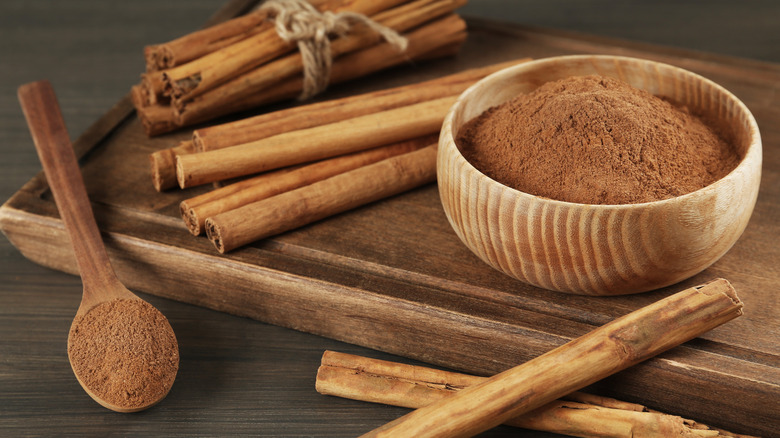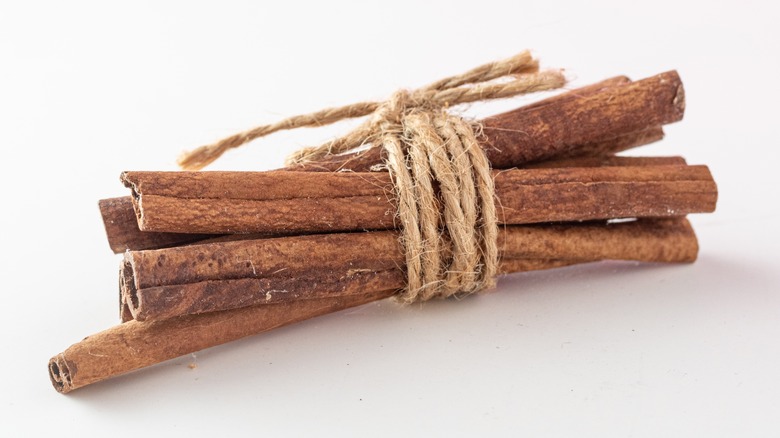The Maximum Amount Of Cinnamon You Can Safely Eat Each Day
Correction 4/25/22: A previous version of this article stated it is thought to be unsafe to consume more than 0.05 milligrams of cassia cinnamon per day for every pound you weigh. It is recommended people not consume more than 0.05 milligrams of coumarin per day for every pound you weigh, which is a chemical compound present in the cinnamon.
No need to put down that cinnamon roll, or delicious piece of cinnamon toast. Eating cinnamon in moderation is just fine, and actually provides quite a few health benefits. But there is a fine line with cinnamon you don't want to cross, as adverse effects can occur if you eat too much of a certain kind on a daily basis.
Yep, you heard right. There's more than one kind of cinnamon. There are two actually, observes Healthline: Ceylon and cassia. The geographically astute may note that the former country of Ceylon is now known as Sri Lanka. The country may have changed its name, but this form of cinnamon has not, and indeed its namesake land provides about 80% of the global supply of what's known as true cinnamon, per WebMD, all sourced from the bark of evergreen trees.
Cassia, by contrast, combines cinnamon and cassia, the latter of which is made similarly — from evergreen trees in China and Southeast Asia — but is considered lower quality. Cassia is by far the most common form of cinnamon used by U.S. consumers (per Healthline), which is an important distinction when it comes to daily usage recommendations.
The recommended daily intake of cinnamon
According to Healthline, cassia cinnamon has high amounts of coumarin, a chemical compound that has been linked in studies to liver damage (via Human & Experimental Toxicology) and an elevated likelihood of developing specific types of cancers or cancerous tumors (via Toxicology and Applied Pharmacology, Food and Chemical Toxicology, and the National Toxicology Program).
Because of these concerns, and other adverse side effects like mouth sores or breathing issues, the outlet advises eating no more than 0.05 milligrams of coumarin per day for every pound you weigh. So a 150-pound person, for example, could tolerate 7.5 milligrams per day, or 3 teaspoons of cassia cinnamon. The simple way to avoid doing the math, of course, is to eat only Ceylon, or true cinnamon. It's more expensive and less common, but available in many supermarkets and specialty stores.
This said, the recommended daily intake of cinnamon is much lower. Per WebMD, a daily intake of ½ to 1 teaspoon of cinnamon per day is the limit, per some experts. This equals 2 to 4 grams of cinnamon a day, with the U.S. Department of Health saying that up to 6 grams of cinnamon per day is safe (via The Whole U).
The healthful benefits of cinnamon
Between the two types of cinnamon, true cinnamon has more antioxidant properties, according to The Spruce Eats, but cinnamon of either variety ingested in moderation offers a host of positive health benefits. One of the most interesting is that it may help to fight the HIV virus. Per a study published in the Indian Journal of Medical Research, of 69 plant species screened for effectiveness in treating HIV-1 and HIV-2, cinnamon was the most effective against HIV-1.
As Healthline notes, cinnamon oil is purportedly effective in fighting infections of a fungal or bacterial nature, and the spice is considered a potent anti-inflammatory. Cinnamon can also lower blood sugar and may help in the prevention of heart disease and some cancers. However, as the National Center for Complementary and Integrative Health notes, much more research needs to be done on cinnamon before these claims and others like helping with weight loss or controlling cholesterol levels can be said conclusively.
But whether you use cassia cinnamon or true cinnamon, keep moderation in mind; don't overdo it when it comes to cinnamon.


